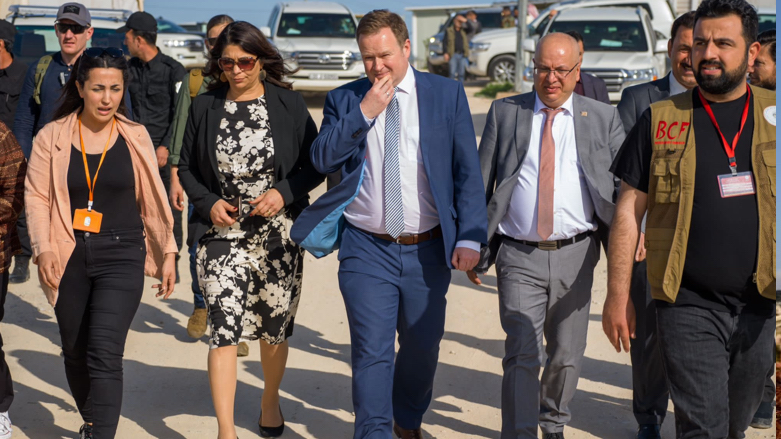German delegation praises Kurdistan’s religious diversity

ERBIL (Kurdistan 24) – A German parliamentary delegation this week visited the Kurdistan Region to examine the situation of religious minorities and religious coexistence in Region.
A delegation led by Federal German Government’s Commissioner for Freedom of Religion or Belief Frank Schwabe and Derya Türk-Nachbaur, deputy of the Social Democrats (SPD) arrived on April 4 in the Kurdistan Region. They were accompanied by Germany’s Deputy Consul General in Erbil Sven Mossler.
Rich dialogue with members of the components @KurdistanParl & religious delegates #MinistryOfEndowmentAndReligiousAffairs. Different religious & ethnic groups have long traditions in the #KRI & 🇩🇪 is supportive of this respectful #coexistence. pic.twitter.com/djKGo491BU
— German Consulate Erbil (@GermanyInKRI) April 5, 2023
The delegation visited members of the Kurdistan parliament and the Ministry of Endowment and Religious Affairs. “Different religious and ethnic groups have long traditions in the KRI (Kurdistan Region of Iraq) and Germany is supportive of this respectful coexistence,” the German Consulate tweeted.

MP Derya Türk-Nachbaur, told Kurdistan 24 that “we looked into the situation of minorities in Iraq and had many interesting discussions.”
Read More: German parliament’s Yezidi genocide recognition is a crucial step: German FM
She also said that it had been almost three months since the German parliament recognized the genocide committed against the Yezidis. “As the MP who negotiated the resolution for my governing party, I feel responsible for ensuring that the 20 points listed in the resolution are implemented.”
“In many of the discussions we had with the affected communities, the situation in the IDP (Internally Displaced Persons) camps has been raised. The displacement of the Yazidis (Yezidis) from their homeland must stop. All Iraqi citizens have the right to live in dignity.”
In the meeting with the German delegation, the Secretary of the Kurdistan Parliament, Muna Kahveci, thanked the the German Parliament for its recognition of the Yazidi genocide.
Moreover, MP Derya Türk-Nachbaur told Kurdistan 24 she is “very confident that the new government in Iraq and the regional government will find a common solution in the interest of their citizens.”
In 2020, Erbil and Baghdad signed a UN-supported Sinjar Agreement, with the goal of normalizing the security of the Yezidi-majority district. “Hopefully, the Sinjar Agreement will be implemented soon,” Mp Türk-Nachbaur added.

Amir Othman, Manager of the Religious Coexistence Department of the KRG Ministry of Endowment, after meeting with the delegation, told Kurdistan 24 that “Kurdistan has long been a bastion of peaceful coexistence, with its people embracing each other in a spirit of mutual acceptance, even in times of crisis.”
“This harmonious coexistence is underpinned by legal frameworks and has become a cultural norm amongst the diverse constituents of Kurdistan. Such a phenomenon is significant both domestically and on the global stage, as the international community's attention is focused in the region,” he said.
#Lalish, the holy city of the #Yezidis, was an important visit for the delegation. With Prince Hazem Tahsin Beg and the spirtual leaders we discussed the necessary implementation of the resolution of the 🇩🇪 @Bundestag. pic.twitter.com/V0H2ChNyD5
— German Consulate Erbil (@GermanyInKRI) April 6, 2023
Moreover, he said the German delegation was “impressed by the unique experience they had in Kurdistan. They visited different religious sites across the region, including the ancient religious sites of Lalesh and Christian monasteries, and saw firsthand the people of Kurdistan's eagerness for coexistence.”
“The dimensions of coexistence are multifaceted, and the (KRG) administration has made significant efforts to promote it. This has resulted in a favorable reputation for the region and an increase in trust between religious communities. As a consequence, cultural, diplomatic, religious, and economic relations have grown stronger, promoting social, economic, diplomatic, and political growth in the region,” he concluded.
“Kurdistan has set a standard for peaceful coexistence and continues to support refugees and internally displaced people from central and southern Iraq. [Without assistance from the federal government], the KRG with its limited resources has provided housing, food, and security. This has not happened in other regions, and as a result, it is imperative that countries establish diplomatic, cultural, and religious relations with Kurdistan.”
“Religious coexistence is a critical point for Kurdistan, both domestically and internationally, and violating this principle is a red line that cannot be crossed.”
Nadine Maenza, a Global Fellow at the Wilson Center, and the President of the International Religious Freedom (IRF) Secretariat, told Kurdistan 24 it’s always important to “encourage the community to safeguard their religious freedom conditions. We've all talked about how positive they are here.”
However, she added that “you always need to safeguard them because it's easy to lose sight of how important they are and to allow them to erode.”
